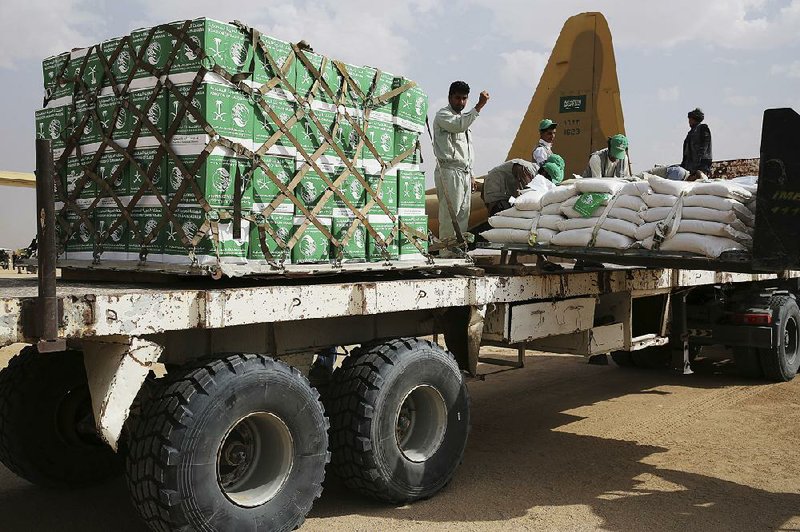DUBAI, United Arab Emirates -- Yemen's Shiite rebels fired a barrage of ballistic missiles targeting Saudi Arabia late Sunday on the third anniversary of a kingdom-led war in Yemen, with fragments of one missile over Riyadh killing one person and wounding two.
The casualties were the first in Saudi Arabia's capital since the Saudi-led war in Yemen began in March 2015, though previous rockets fired by the Yemeni rebels have caused deaths in other parts of the kingdom.
The rebels known as Houthis said they launched a missile attack targeting Riyadh's King Khalid International Airport and other sites, again showing their ability to strike deep into the neighboring kingdom amid the stalemated war in Yemen, the Arab world's poorest country.
The barrage likely will spark new criticism of Iran's role in the conflict as well, as the Houthis identified some of the missiles fired as a type that the United Nations and the West say comes from Tehran.
The Saudi military said it intercepted seven ballistic missiles fired by the Houthis at the kingdom, three of them targeting Riyadh, two targeting Jazan and one apiece targeting Najran and Khamis Mushait.
The Saudi-owned satellite news channel Al Arabiya aired footage that it said showed Patriot missile batteries firing at the incoming Houthi missiles. Online videos showed what appeared to be a missile fuselage lying on a street in Riyadh.
One Egyptian national was killed and two other Egyptians suffered wounds when a fragment of a missile over Riyadh fell on a residential neighborhood, the state-run Saudi Press Agency said.
Al Masirah, a Houthi-run satellite news channel, identified some of the missiles fired as the Burkan, or Volcano, missile. The United Nations, Western countries and the Saudi-led military coalition fighting in Yemen all say the Burkan mirrors characteristics of an Iranian Qiam ballistic missile. They say that suggests Tehran either shared the technology or smuggled disassembled missiles to the Houthis who then rebuilt them.
Iran long has denied supplying arms to the Houthis, though a growing body of evidence contradicts their claim.
Meanwhile, a top official in the U.N. children's agency said Sunday that warring sides in Yemen and their international backers must stop blocking or delaying aid deliveries, warning that such practices have contributed to worsening malnutrition among children and hampered efforts to fight cholera.
Geert Cappelaere, UNICEF's director for the Middle East and North Africa, spoke as civil war in the Arab world's poorest country -- a proxy battle between regional rivals Saudi Arabia and Iran -- enters its fourth year.
The fighting pits Iran-backed Shiite Houthi rebels against Yemen's internationally recognized government, which is allied with a Saudi-led military coalition. The war started in March 2015 when the coalition began pounding the Houthis with airstrikes after they took control of the capital, Sanaa.
The stalemated war has damaged Yemen's infrastructure, crippled its health system and pushed it to the brink of famine. The country now suffers the world's worst humanitarian crisis, with more than 22.2 million people in need of assistance. Malnutrition, cholera and other diseases have killed or sickened thousands of civilians over the years.
Cappelaere briefed reporters in the Jordanian capital of Amman on Sunday, after returning from Yemen.
He called for an end to what he said was a brutal war against Yemen's 11 million children.
In the absence of a political settlement, the combatants and their backers must ensure free access for aid shipments, without conditions, he said.
Cappelaere said precious weeks and months have been lost in haggling over the delivery of key supplies, such as solar power equipment, water pipes and fuel, to ensure access to clean water as aid agencies try to contain cholera and watery diarrhea.
"The minimum we should be asking for is that all children, boys and girls, in every single part of Yemen are reached with the minimum assistance," he said.
Last year, more than one million Yemenis suffered from cholera and watery diarrhea, he said, adding that the next outbreak is likely only weeks away, with the start of the rainy season.
He said severe acute malnutrition among children has doubled in the past three years, from 200,000 in 2015.
Information for this article was contributed by Karin Laub and Omar Akour of The Associated Press.
A Section on 03/26/2018
